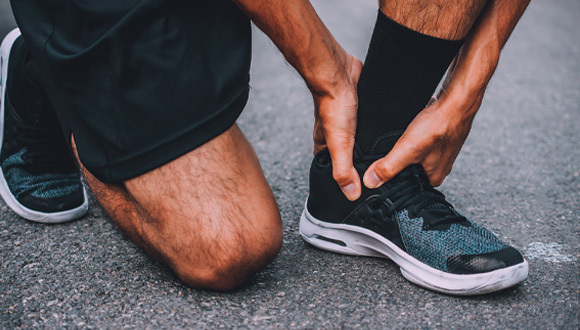Whether you're exercising, moving furniture or even just stepping down from a curb, injuries are bound to happen. In the aftermath, you're likely wondering what to do next.
Should you just walk it off? Try to schedule a doctor's appointment the next day? Go to an urgent care clinic the same day? Or head to the ER immediately?
Every year millions of people who end up in the emergency room or doctor's office with orthopedic injuries have this debate.
"The big question after an injury is often where to go for medical care, or whether medical care is needed," says Dr. David Lintner, an orthopedic surgeon and chief of sports medicine at Houston Methodist.
Minor injuries can often be treated at home, but there are times when you should see a doctor to ensure proper healing.
5 steps to take after any injury
Whether you were hurt at home or while you were out and about, deciding what to do after an injury can be stressful. You may feel compelled to push through the pain, but continuing to move the injured area could lead to further damage and a longer recovery time.
"It's important to recognize that an injury is a sign you've pushed your body too far and you need to rest," says Dr. Lintner.
Here are the steps Dr. Lintner advises taking after an injury:
- Rest the injured area to avoid further injury
- Apply ice or compression to reduce swelling
- Elevate the injured area
- Protect the injured area by wearing a cast or brace, or using crutches, if needed
Lastly, evaluate your injury for signs that it may be serious enough to warrant seeing a doctor.
How do you know if an injury needs treatment?
How do you know if you have a minor injury that'll heal on its own or if it's more significant and needs treatment from a doctor?
Your ability to bear weight on the joint is key
"For a knee or ankle injury that's causing you to walk with a limp, you should go to our injury clinic or see a physician for evaluation and possibly X-rays," Lintner said. "If you can't bear weight, you should use crutches and see a doctor promptly."
Any injury that triggers swelling in the ankle or knee should also be evaluated
The majority of these injuries don't need to be evaluated immediately in the hospital, but they should be evaluated soon in a doctor's office.
"If you have any doubts, it's a good idea to get checked out by an orthopedic specialist or sports medicine doctor," adds Dr. Lintner.
The question with swelling, though, is when it's okay to wait and when it's not. As a rule of thumb, if joint swelling comes on rapidly and is associated with one of the warning signs below, it's important to seek treatment to rule out a fracture or other serious injury.
Warning signs the injury is serious and needs medical evaluation right away
Whether it's a strained muscle, broken bone, injured tendon or minor dislocation, some injuries need to be evaluated and treated.
The signs that you should seek medical help right away after an injury include:
- Any deformity of the limb
- Inability to bear weight
- Persistent joint pain
- Significant swelling with inability to move fingers or toes
- Swelling of a joint that comes on rapidly
- Weakness when moving a limb or muscle
How long does it take a sprain, strain or other orthopedic injury to heal?
Some injuries take longer to heal compared to others, depending on the location and severity of the injury, your age, overall health and other factors.
The standard home management treatment is known as RICE (rest, ice, compression and elevation). In addition, a doctor may recommend anti-inflammatory medication, cortisone injections or surgery to repair torn muscles or ligaments.
For injuries that don't heal quickly on their own, physical therapy can be a key part of the recovery process.
The following are ranges of average recovery times for common orthopedic injuries:
- Hamstring strains: A few days for a mild strain; up to 3 months for a partial or complete muscle tear
- Ankle sprains: 1-3 weeks for a mild sprain; up to several months for a severe sprain
- Broken bones: 6-8 weeks for most simple fractures; up to several months for more complicated fractures
- Tennis elbows: Most people improve in 4-6 weeks
- Shin splints: Up to 3-6 months
- Anterior cruciate ligament (ACL) tears: 4-6 months for recovery from knee surgery
- Rotator cuff injury: 4-6 months for recovery from rotator cuff repair surgery








